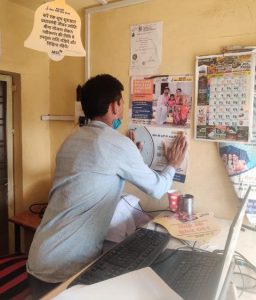Testing a behavioral design approach to deliver product information at agent outlets
by Akhand Tiwari, Mimansa Khanna and Sombul Munshi
May 16, 2022
4 min
Low- and moderate-income (LMI) Indians have limited customer awareness and behavioral biases, which affect how well they take to government-backed insurance products at agent outlets. This blog discusses an innovative experiment conducted by MSC and FIA Global on a communication toolbox for business correspondent agents.
“I believe the most important thing in my business is to provide good service to customers and build their trust in financial products and services. Customers are not aware of various financial products, so I try to inform them about new products when they come to withdraw government benefits in their accounts—mostly in the first week of the month. Yet they do not enroll in them at my outlet, even after knowing about the product.” —A business correspondent (BC) agent from Damoh district, Madhya Pradesh (M.P.).
Almost 1 billion Indians lack life insurance coverage – a vast proportion of the population remains untapped. The Government of India launched a slew of flagship life and accident microinsurance products in 2015, such as Pradhan Mantri Jeevan Jyoti Bima Yojana (PMJJBY), and Pradhan Mantri Suraksha Bima Yojana (PMSBY). The government’s initiative made these products accessible and affordable, yet their uptake remains low. The report on Financial Literacy and Inclusion in India by the National Centre for Financial Education in 2019, noted that awareness and holding of PMSBY policies in rural areas is 28% and 6%, respectively. A similar percentage holds for PMJJBY. The report mentions that the most important reasons for not opting for insurance include the lack of felt need and lack of knowledge. Moreover, customers have low awareness of BC agent services (46%) and a low proportion of people use BC outlets (28%). In fact, the use of BC agent outlets for DBT is much lower. Our study to understand the Effectiveness of India’s DBT system during COVID-19 indicates that between April to May, 2020, among the 67% of respondent households that visited a cash-out point during the lockdown, only 13% visited a BC agent or CSC point.
Customers have limited trust in agents – particularly with products that will only yield a return in the future such as insurance products. This low trust is amplified by limited awareness of the products and their features, nature of benefits, the perception that the products are expensive, and negative word-of-mouth about the products from those who have tried them, which further restricts uptake. Concerted efforts are needed to market long-term products, such as insurance products, to build awareness and understanding of their benefits among low- and moderate-income (LMI) people.
MSC and FIA Global[1] conducted an experiment to improve the awareness of the LMI segment around government-backed insurance products (PMJJBY, PMSBY) and enhance their uptake through agent outlets. We designed and tested a toolbox that included a set of behavioral change communication tools incorporating human-centered design principles[2] to help agents build awareness and sell PMJJBY and PMSBY to LMI people.
The communication toolbox supports product information delivery to overcome behavioral biases that limit customer interest in the product and thus product uptake. The tools support agents to nudge existing and potential customers to move to desired behavior. The toolbox equips agents with tools to interact with customers, influence behavior, engage more customers, and build a positive customer experience.
The toolbox was rolled out in June 2021. It enhanced the customer-agent engagement and increased enrolment of insurance products that were relatively difficult to sell. This helped diversify the products sold by agents and increased their revenue streams. In the assessment period of June- November, the total enrolment in PMJJBY (by both women and men) grew by 36% in 2021 compared to 2020. PMJJBY sales also increased in comparison to PMSBY, which is comparatively easier to sell as compared to PMJJBY. This could be because PMSBY costs INR 12 (USD 0.16) per annum and PMJJBY INR 330 (USD 4.44) per annum. The ratio of PMJJBY/PMSBY insurance enrolled increased by 38% from 2019 to 2020. This ratio almost doubled from 2020 to 2021.
The BC agents used a combination of physical and digital elements in the toolbox creatively to engage potential customers. BC agents found the audio and video links (1, 2, 3) beneficial and used them creatively on social media. They used them as their WhatsApp status, forwarded the videos to customers on WhatsApp, and displayed the videos on their mobiles and laptops. These helped establish trust among agents, influence customers, and save time by communicating key product benefits, features and terms. Collaterals designed in unique shapes, such as bell tags, proved to be a good reminder for customers and led them to ask agents about insurance products. Customers found the in-store promotional collaterals self-explanatory and informative, so that they generated the desire to learn more.

The communication toolbox empowered BC agents to promote the products requiring long-term financial commitments from customers. Agents could raise awareness, engage with, make the product and services more visible to, and serve customers. The increased engagement led to more enrolments and drove the adoption of insurance products among people from the LMI segments—a win-win for all.
At the time of writing, MSC and FIA Global have been scaling up the communication toolbox to support its 25,000 agents in their customer interactions and diversify their revenue streams. FIA Global also plans to integrate the communication toolbox in its existing digital communication system for BC agents.
Figure 1: An agent using the collaterals at his outlet in Damoh
[1] A leading BCNM in India with a network of 25,000+ BC agents that serves rural areas
[2] Human-centred design principles are used in MI4ID (Market Insights for Innovation and Design), MSC’s flagship design thinking approach. It incorporates principles of behavioural economics and human-centred design.
 by
by  May 16, 2022
May 16, 2022 4 min
4 min


Leave comments